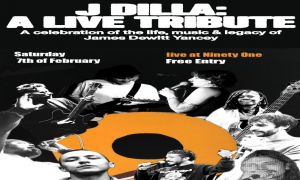
There's something haunting about Robert Johnson's voice. The blues singer-guitarist sounds at once cock-sure and frightened, giving his recordings the feel of both perspiration and a cold sweat. As I wrote in Friday's Wall Street Journal review (here), Robert Johnson: The Complete Recordings (Sony/Legacy) continues to illustrate that given a chance, simplicity and passion will trump technique and quantity every time.
Johnson recorded only 29 master tracks, yet he was one of the most powerful influences on jazz, folk and rock of the '40s, '50s and '60s. Why is this the case? After all, there were plenty of blues artists before and since, and many were authentic products of the Mississippi Delta. There are three general reasons, with the first two being less important than the third.
First, the spare number of sides that Johnson recorded helped establish his mystque. Scarcity has a way of concentrating focus and increasing demand. Second, Johnson died young—at age 27. He was poisoned after foolng around with the owner of a juke joint outside Greenwood, Miss., where he was performing. Sudden death and high-risk affairs also work wonders on legacies.
But even more important is the fact that Johnson's recordings are emotionally restless. As you listen to them, they come across like an uncontrollable shiver. His guitar playing is jangly and jarring, as though he's strumming an aluminum instrument with copper wires. Through his wails and low-voice grumbles, we taste the clay dust of the South and smell the thick foliage. In this regard, Johnson's songs have transporting powers.
While all of Johnson's recordings have been available digitally since the '90s, this new set is absolutely free of hiss and pops, and now has a conical depth and warmth that makes Johnson sound even more intimate and contemporary. You can even hear the guitar strings move and his hands slide down the neck.
Born in 1911, Johnson took an early interest in music. His career began in earnest in 1930, after his wife and child died in childbirth. Restless, Johnson moved steadily from town to town with his guitar, playing for money whenever he could land a job. Unlike his contemporaries, his blues wasn't the stuff of cotton picking or hammering railroad ties. Instead, what we have are stories of love, travels and battling personal demons.
Johnson also offered the listener enormous variation. His guitar playing switched from rhythmic swing to twangy lines, often within the same song. There's also an economic purity to his playing. Johnson never tries to show off but instead is merely concerned with a solid rhythmic accompaniment and textured interchanges with his voice.
Adding to his aura was Johnson's claim that his guitar-playing prowess was the result of a chance midnight encounter with the devil at the intersection of several roads. Johnson certainly understood the value of being mystified by one's own genius and the drama of of summoning Mephistopheles.
Unfortunately, Johnson's recording success swelled his head, leadng him to think of himself as invincible. Which is yet another reason why '60s British guitar rockers found his blues so endearing and his story so compelling. What's '60s rock without demons?
Johnson died in August 1938—just month before being discovered on a national level. As Stephen C. LaVere writes in the the new set's liner-notes bio:
“In late 1938, [producer] John Hammond began recrutiing talent for his first From Spirituals to Swing concert. He called Don Law in Dallas and asked him if he could round up Robert Johnson and get him to New York for his presentation at Carnegie Hall. Hammond thought Johnson the greatest of all the country blues players and wanted him to fill one of the opening slots in his show.
“Law got the word to [record company owner] Ernie Oertle, who set out to locate Johnson. It had been more than a year since Oertle had been in contact with Johnson, and it took some digging before he learned the truth and got it back to Law—Johnson had died recently under uncertain circumstances...
“Johnson's failure to appear at From Spirituals to Swing was a great disappointment to Hammond, and he never stopped pondering what it could have meant to Johnson had he been able to make it."
Johnson remains a ghostly figure, his songs being the only evidence we have of a bluesman who seemed to have visited the future and was merely reporting back in song.
JazzWax tracks: Robert Johnson: The Complete Recordings (Sony/Legacy) comes in two different packages. The first is a two-CD set that holds Johnson's master and alternate takes from his San Antonio and Dallas sessions in 1936 and 1937, respectively. You'll find this two-CD set here.
Sony also is issuing a Centennial Edition with five 78-rpm replicas that spin at 45-rpm. The set includes the two CDs of Johnson's recordings plus a CD of blues recordings that influenced Johnson and a CD of other artists who recorded on the sames days as Johnson and in the same studios. The final disc is a DVD of The Life And Music Of Robert Johnson: Can't You Hear The Wind Howl. You'll find the set here.
JazzWax clip: Here's Robert Johnson's Sweet Home Chicago with terrific scenes of what I assume is Chicago in the '30s...
Johnson recorded only 29 master tracks, yet he was one of the most powerful influences on jazz, folk and rock of the '40s, '50s and '60s. Why is this the case? After all, there were plenty of blues artists before and since, and many were authentic products of the Mississippi Delta. There are three general reasons, with the first two being less important than the third.
First, the spare number of sides that Johnson recorded helped establish his mystque. Scarcity has a way of concentrating focus and increasing demand. Second, Johnson died young—at age 27. He was poisoned after foolng around with the owner of a juke joint outside Greenwood, Miss., where he was performing. Sudden death and high-risk affairs also work wonders on legacies.
But even more important is the fact that Johnson's recordings are emotionally restless. As you listen to them, they come across like an uncontrollable shiver. His guitar playing is jangly and jarring, as though he's strumming an aluminum instrument with copper wires. Through his wails and low-voice grumbles, we taste the clay dust of the South and smell the thick foliage. In this regard, Johnson's songs have transporting powers.
While all of Johnson's recordings have been available digitally since the '90s, this new set is absolutely free of hiss and pops, and now has a conical depth and warmth that makes Johnson sound even more intimate and contemporary. You can even hear the guitar strings move and his hands slide down the neck.
Born in 1911, Johnson took an early interest in music. His career began in earnest in 1930, after his wife and child died in childbirth. Restless, Johnson moved steadily from town to town with his guitar, playing for money whenever he could land a job. Unlike his contemporaries, his blues wasn't the stuff of cotton picking or hammering railroad ties. Instead, what we have are stories of love, travels and battling personal demons.
Johnson also offered the listener enormous variation. His guitar playing switched from rhythmic swing to twangy lines, often within the same song. There's also an economic purity to his playing. Johnson never tries to show off but instead is merely concerned with a solid rhythmic accompaniment and textured interchanges with his voice.
Adding to his aura was Johnson's claim that his guitar-playing prowess was the result of a chance midnight encounter with the devil at the intersection of several roads. Johnson certainly understood the value of being mystified by one's own genius and the drama of of summoning Mephistopheles.
Unfortunately, Johnson's recording success swelled his head, leadng him to think of himself as invincible. Which is yet another reason why '60s British guitar rockers found his blues so endearing and his story so compelling. What's '60s rock without demons?
Johnson died in August 1938—just month before being discovered on a national level. As Stephen C. LaVere writes in the the new set's liner-notes bio:
“In late 1938, [producer] John Hammond began recrutiing talent for his first From Spirituals to Swing concert. He called Don Law in Dallas and asked him if he could round up Robert Johnson and get him to New York for his presentation at Carnegie Hall. Hammond thought Johnson the greatest of all the country blues players and wanted him to fill one of the opening slots in his show.
“Law got the word to [record company owner] Ernie Oertle, who set out to locate Johnson. It had been more than a year since Oertle had been in contact with Johnson, and it took some digging before he learned the truth and got it back to Law—Johnson had died recently under uncertain circumstances...
“Johnson's failure to appear at From Spirituals to Swing was a great disappointment to Hammond, and he never stopped pondering what it could have meant to Johnson had he been able to make it."
Johnson remains a ghostly figure, his songs being the only evidence we have of a bluesman who seemed to have visited the future and was merely reporting back in song.
JazzWax tracks: Robert Johnson: The Complete Recordings (Sony/Legacy) comes in two different packages. The first is a two-CD set that holds Johnson's master and alternate takes from his San Antonio and Dallas sessions in 1936 and 1937, respectively. You'll find this two-CD set here.
Sony also is issuing a Centennial Edition with five 78-rpm replicas that spin at 45-rpm. The set includes the two CDs of Johnson's recordings plus a CD of blues recordings that influenced Johnson and a CD of other artists who recorded on the sames days as Johnson and in the same studios. The final disc is a DVD of The Life And Music Of Robert Johnson: Can't You Hear The Wind Howl. You'll find the set here.
JazzWax clip: Here's Robert Johnson's Sweet Home Chicago with terrific scenes of what I assume is Chicago in the '30s...
This story appears courtesy of JazzWax by Marc Myers.
Copyright © 2026. All rights reserved.




























